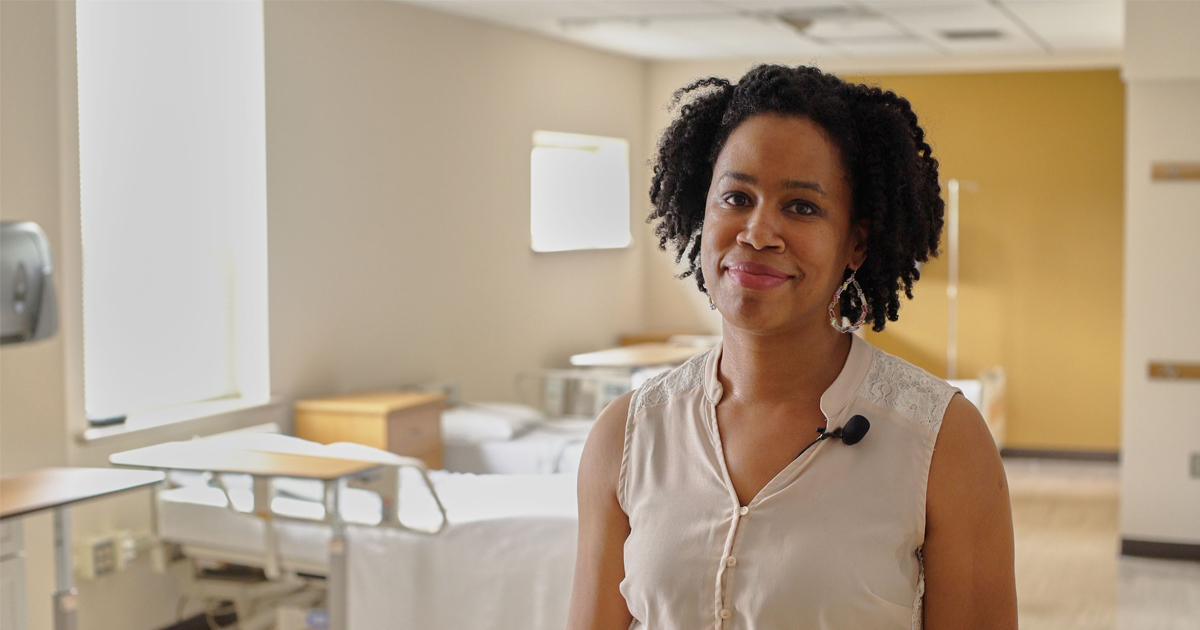La Salle University
Public health professor completes elite national fellowship program
Candace Robertson-James, DrPH, was one of 61 professionals invited to participate in the BMe Vanguard Fellowship.
Last fall, only 61 professionals received invitations to participate in a national fellowship program that united Black leaders across various industries to achieve greater influence in their communities.
One of the participants was a La Salle University faculty member.
Candace Robertson-James, DrPH, assistant professor of public health and director of La Salle’s public health programs, completed the BMe Vanguard Fellowship program, an elite leadership experience designed and facilitated by leading global authorities on social innovation, influence, health, finance, narrative, race, and culture.
The fellowship, which ran from June through October, featured virtual, weekend-long cohorts that bridged 61 fellows in a national program through a competitive application and selection process. Robertson-James was the only fellow from the Philadelphia area.
“It’s a humbling experience, working alongside chief executives, grant makers, activists, television personalities, and other leaders. It was fantastic to learn from their experiences and share mine,” said Robertson-James, who also chairs the Department of Urban Public Health and Nutrition. “In my application, I highlighted the role of an educator—someone with a platform to train future professionals and practitioners.”
The fellowship centered on a theme—The Agenda for Black L.O.V.E.—that prioritized the value of personal well-being, financial literacy, civic engagement, and the amplification of Black successes. Among the fellowship’s many programs, Robertson-James said she identified with one built around the concept of asset framing, “defining communities by their assets and strengths.” Typically, we operate on deficits as “what is marginalized is what sells.”
“It’s an idea that’s built into public health,” she said. “We say it quite often: ‘These people are at greater risk for this disease, that disease, and so on.’ It’s built into our world. While teaching in the fall semester, I was more conscious of our communities. I became more aware of how that kind of deficit framing can be damaging to students and, in altering your approach, it makes you a more authentic and compassionate public health leader.”
Asset framing factored into a Together and By Association (TABA) course for first-year students that Robertson-James led with Maureen O’Connell, Ph.D., associate professor of religion and theology. TABA courses are distinct but interrelated, in that they span two or more disciplines but share an overarching theme. Robertson-James and O’Connell explored the overlap of religious belonging and public health through the lens of La Salle’s Belfield neighborhood.
“TABA allows two professors to teach on the same theme from two disciplinary platforms,” Robertson-James said. “It was interesting to hear the narratives of those who come into La Salle as first-year students and make sense of those narratives.”
In addition to her academic work, which includes the launch of a Master of Public Health program for which she serves as director, Robertson-James has been an instrumental leader in the University’s return-to-campus planning throughout the COVID-19 pandemic.
Robertson-James also is a children’s book author. Published in late 2019, “Reflections of Me” aims to help young women of color overcome the self-defeating images, messages, and thoughts to which they are commonly exposed. The book provided Black women a platform to share “the messages they wish they would have heard in their early years,” Robertson-James said.
Robertson-James is already looking to apply her experiences from the fellowship to advance racial equity in La Salle’s public health programs through innovative and reimagined curriculum.
Just last fall, she led an initiative from the Department of Urban Public Health and Nutrition that addressed racial equity and proposed specific programmatic strategies that will be implemented, said Kathy Czekanski, Ph.D., dean of La Salle’s School of Nursing and Health Sciences. That work last semester, Czekanski said, included a discussion for faculty, staff, and students on the book, “The Deepest Well,” which focuses on healing the long-term effects of childhood adversity. Robertson-James also led an assessment of La Salle’s public health curricula for content on promoting racial equity and justice.
“Through this work, Dr. Robertson-James is a role model for all of our programs as we look to ensure that we all meet this commitment,” said Czekanski, who referred to Robertson-James as “a well-regarded colleague who is passionate about public health and committed to collegiality, diversity, and inclusion in alignment with the mission of La Salle University.”
The Vanguard BMe Fellowship, Czekanski said, “was an excellent opportunity for Dr. Robertson-James to take our university’s commitment to social justice, equity, diversity, and inclusion to the next level.”
The BMe Vanguard Fellowship introduced Robertson-James to other Black leaders, entrepreneurs, and trailblazers across the country. Currently, she is working toward a partnership with one of them, LaQuinte’ Brinson, an Atlanta-based life and executive coach with a background in instructional design.
Robertson-James and Brinson are hoping to pilot a leadership development program at La Salle “designed to address and dismantle racial disparities in the workplace,” Brinson said.
“Throughout the fellowship, we shared common interests surrounding public health,” Brinson said. “I was drawn to (Robertson-James’) passion and commitment to help uplift the community through her work. As we began learning more about each other’s goals and aspirations, it opened the door for partnership.”
“At an institution like La Salle, with a mission and foundation in social justice, located in a city like Philadelphia,” Robertson-James said, “we are primed for these conversations and the chances to think critically about pushing ourselves forward and exploring these areas.”
—Christopher A. Vito
